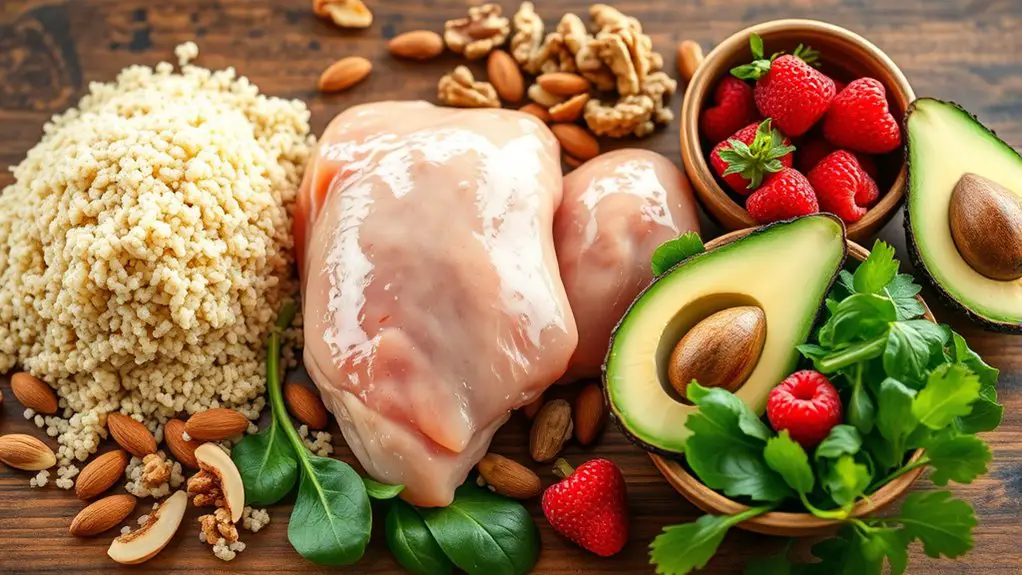Athletes lose weight by focusing on a balanced approach of nutrition, training, hydration, and expert guidance. You’ll want to time your meals to boost your metabolism and fuel your workouts effectively with the right macronutrient ratios. Incorporating both cardio and strength training enhances fat loss while building lean muscle. Staying hydrated is essential for performance and recovery. With support and regular progress checks, you can stay motivated and adjust your goals as needed. There’s so much more to uncover!
The Role of Nutrition in Weight Loss
When it comes to losing weight, nutrition plays a pivotal role that can’t be overlooked. To truly embrace your freedom in weight loss, you need to pay attention to meal timing and macronutrient ratios. Eating at the right times can boost your metabolism and help regulate hunger, allowing you to better manage your cravings. Balance your plate with the right mix of proteins, fats, and carbohydrates to fuel your body efficiently. This isn’t just about cutting calories; it’s about giving your body what it needs to thrive. Proper pre-workout nutrition can enhance your energy levels, helping you stay active and engaged in your weight loss journey. Listening to your body’s signals and adjusting your intake based on activity levels can empower you to make choices that align with your weight loss goals. Embrace this journey to feel liberated and energized!
Training Regimens: Balancing Cardio and Strength
How can you find the right balance between cardio and strength training for effective weight loss? Start by incorporating interval training into your routine. This method boosts your metabolism and maximizes calorie burn in a shorter time. Pair that with strength circuits to build lean muscle, which helps you burn more fat even at rest. Aim for a cardio balance that complements your strength workouts, ensuring you’re not overtraining. Recovery workouts are just as essential; they allow your body to heal while keeping your fitness levels up. By blending these elements, you’ll create a dynamic training regimen that supports weight loss without sacrificing your freedom to enjoy your workouts. Additionally, ensure that you focus on nutrition strategies for improved stamina, as proper fueling can enhance your performance and recovery. Embrace the journey, and watch your body transform!
Hydration Strategies for Optimal Performance
Balancing cardio and strength training is just one piece of the puzzle for athletes aiming to lose weight and improve performance. Hydration techniques play a significant role in maintaining fluid balance, which directly impacts your energy levels and recovery. Here are some effective strategies to take into account:
| Hydration Technique | Purpose |
|---|---|
| Drink water regularly | Maintain fluid balance |
| Use electrolyte drinks | Replace lost minerals |
| Track fluid intake | Guarantee adequate hydration |
| Hydrate before workouts | Enhance performance |
| Rehydrate post-exercise | Aid recovery |
Proper hydration supports optimal performance, ensuring that athletes can train effectively and recover quickly.
The Importance of Expert Guidance and Support
While pursuing weight loss and performance goals, having expert guidance and support can make a significant difference in an athlete’s journey. You’ve got dreams of reaching your peak, and tapping into expert advice can help you navigate the complexities of nutrition and training. Coaches, nutritionists, and trainers offer insights tailored to your unique needs, ensuring you’re not just guessing your way through.
Moreover, cultivating strong support systems—like teammates, family, or mentors—can keep you motivated and accountable. When you face challenges, knowing you have a network cheering you on can make all the difference. Embracing this expert guidance and surrounding yourself with supportive people empowers you to pursue your goals with confidence and freedom. Additionally, understanding meal timing can optimize your energy levels and recovery, further enhancing your weight loss and performance efforts.
Monitoring Progress and Adjusting Goals
With expert guidance and a solid support system in place, it’s time to focus on monitoring your progress and adjusting your goals. You want to feel empowered and in control of your weight loss journey. Regular weight tracking helps you understand what works and what doesn’t, allowing you to refine your approach.
Consider these key aspects:
- Set realistic, achievable goals to keep you motivated.
- Track your weight weekly to identify trends and make adjustments.
- Celebrate small victories to maintain your momentum.
- Stay flexible; if something isn’t working, don’t hesitate to pivot your strategy.
- Incorporating rest days into your routine can enhance recovery and performance, ultimately supporting your weight loss efforts.
Frequently Asked Questions
How Do Mental Health and Weight Loss Relate for Athletes?
Mental health and weight loss are tightly intertwined for you as an athlete. When you build mental resilience, you’re better equipped to manage stress and avoid emotional eating, which can sabotage your goals. By fostering a positive mindset and addressing emotional triggers, you can find freedom in your journey. Embracing this balance not only supports your physical health but also enhances your overall well-being, allowing you to perform at your best.
What Common Mistakes Do Athletes Make When Trying to Lose Weight?
When you’re trying to lose weight, ever wonder if you’re making common mistakes? Many athletes underestimate the importance of a balanced caloric deficit, thinking that cutting calories drastically is the way to go. This can backfire, leaving you fatigued and hindered. Also, neglecting hydration levels can lead to poor performance and increased cravings. Remember, it’s about finding a sustainable approach that keeps you energized and focused on your goals while enjoying the journey!
How Does Sleep Impact an Athlete’s Weight Loss Efforts?
Sleep plays a vital role in your weight loss efforts. When you’re sleep deprived, your body struggles to recover, making it harder to lose weight. Poor sleep can increase cravings and disrupt hormones, leading to poor food choices. To enhance your recovery strategies, prioritize quality sleep. Aim for 7-9 hours a night; this’ll help regulate your metabolism and energy levels, making it easier for you to reach your weight loss goals.
Are There Specific Diets Athletes Should Avoid?
Yes, there are specific diets you should avoid. Fad diets often restrict essential nutrients and can hinder your performance and recovery. Instead of jumping on the latest trend, focus on balanced eating that supports nutrient timing—fueling your body before and after workouts. This approach gives you the freedom to enjoy a variety of foods while still achieving your fitness goals. Remember, a sustainable diet is key to long-term success!
How Can Athletes Maintain Weight Loss During Off-Seasons?
To maintain weight loss during off-seasons, you’ve gotta focus on off season strategies that keep you balanced. It’s all about finding that nutrition balance; enjoy your favorite foods but stay mindful of portion sizes. Incorporate regular workouts to stay active and prevent unwanted weight gain. Keep experimenting with new healthy recipes to keep things interesting. Remember, it’s about enjoying your freedom while still being conscious of your goals!




